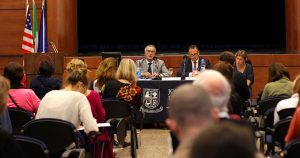The Challenges of Transnational Organized Crime Today
On Tuesday, October 25, 2016, the Department of Modern Languages and Literature welcomed Franco Roberti, Italy’s Chief Antimafia and Antiterrorism Prosecutor, and Michael Gaeta, an FBI agent and current Assistant Legal Attaché at the US Embassy, for “A Roundtable Discussion: The Challenges of Transnational Organized Crime Today.” The discussion was moderated by Dr. Felia Allum from the University of Bath.
The roundtable began with both guests sharing their definition of what transnational organized crime is. Roberti spoke first, pointing out that nearly no crime happens without some sort of organizational structure behind it. Therefore, he continued, it is important to distinguish between “regular” organized crime and mafia-type organized crime (crimine organizzato di tipo mafioso). The first one, Roberti said, would be any crime committed with the support of an organizational structure. A mafia-type one, on the other hand, is characterized by what in Italy is known as the “mafia method,” or the power of intimidation that comes from being part of the mafia and that results in subjugation, fear, and silence from victims and communities. Roberti then defined the four factors that contributed to the growth of all kinds of mafia-type organized crime over the past few years: the globalization of markets (legal and illegal), the vulnerability of economic systems and the presence of tax havens, the vulnerability of political/administrative institutions to corruption, and legislative asymmetries between countries. The last point impacts investigations on transnational groups significantly as, for instance, not every country recognizes mafia-type association as a felony. This asymmetry, in turn, results in stifling investigative and institutional cooperation. However, Roberti continued, it is impossible to fight a transnational group solely on a national level.
Michael Gaeta, who spoke next, agreed with Roberti’s words before explaining his FBI perspective. In the US, Gaeta said, any organized criminal group, regardless of affiliation, can be subjected to RICO law (Racketeer Influenced and Corrupt Organizations Act), a federal law that broadens the definition of organized crime towards any group of individuals and/or businesses associated for the common purpose of engaging in criminal activity over time. Gaeta continued by explaining how 9/11 changed the law enforcement experience, as many resources were switched from fighting organized crime to counterterrorism. A reduction in resources, in turn, translated into foreign criminal organizations being able to infiltrate the US more easily. Presented with this new challenge, the FBI then had to understand how to define, identify and counter these new criminal actors. Once again, Gaeta said, the key to fighting transnational groups is in international cooperation. “You have to have solid relationships on an institutional level between agencies as well as on a personal level between individuals. There has to be a legal structure that makes it possible to share information and intelligence, investigate jointly and potentially extradite,” Gaeta said.
Roberti concluded explaining why fighting mafia organizations is so important. “Every criminal organization, regardless of its type, uses the same tools for financing itself, even ISIS. Therefore, fighting the mafia helps all types of investigations,” Roberti said.






